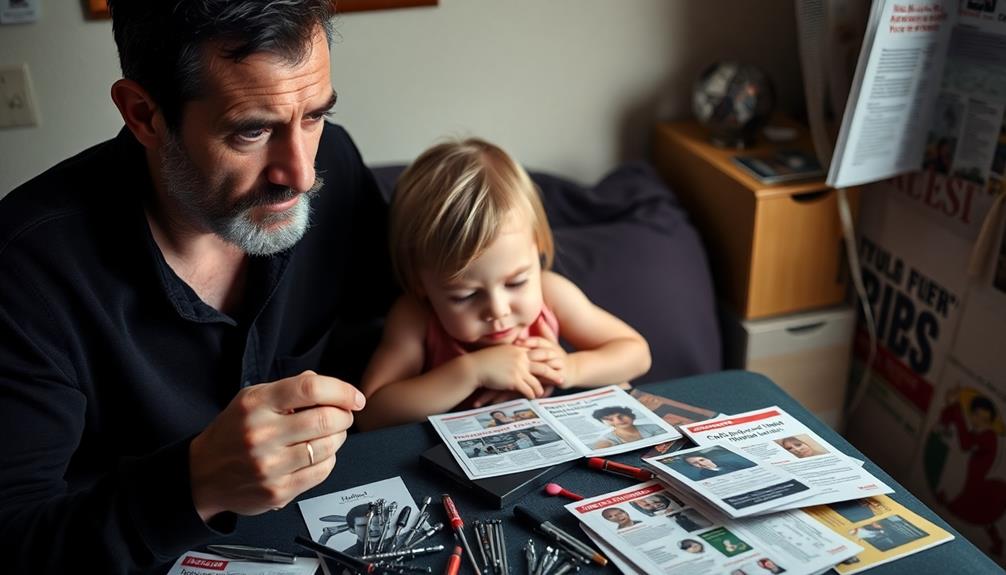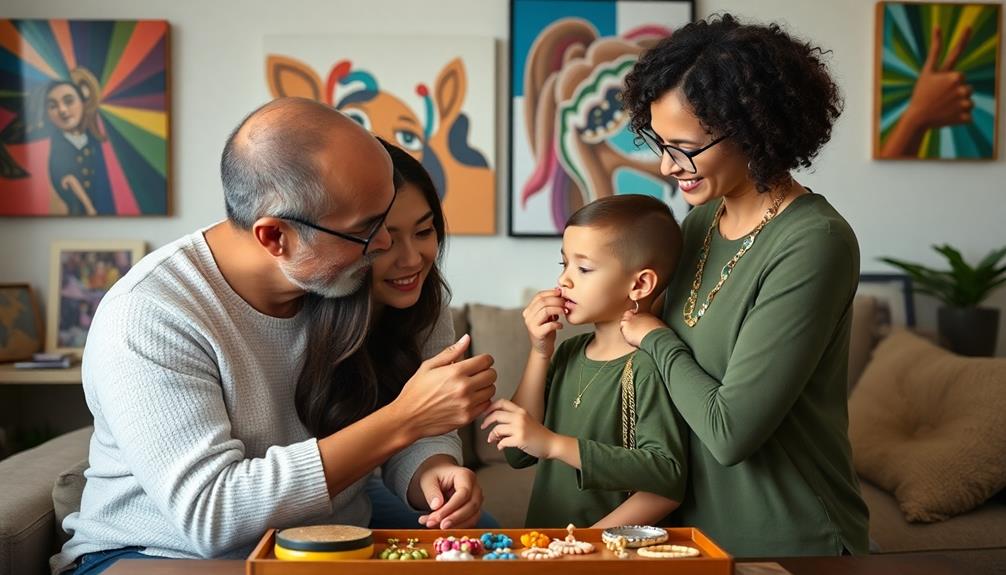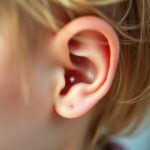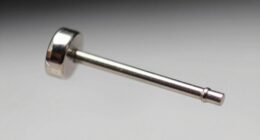Steering piercings and body modifications as a parent means opening lines of communication with your child. Discuss their desires and concerns openly, considering their age and comfort levels, especially since laws require parental consent for certain piercings. It's crucial to understand the risks involved and choose reputable studios that follow safety protocols. Peer influence can shape your teen's choices, so staying informed helps. Setting clear guidelines fosters trust, while empowering them to make informed decisions builds independence. Engaging in these topics thoughtfully will guarantee a supportive environment, leading to better choices around body modifications for your family. There's much more to explore.
Key Takeaways
- Open communication with your teen about body modifications fosters understanding and addresses safety concerns effectively.
- Ensure parental consent is secured for piercings, as required by California law, excluding earlobes.
- Research and choose reputable piercing studios that follow strict safety protocols and use sterile equipment.
- Discuss potential risks and health concerns associated with piercings to prepare your teen for informed decisions.
- Be aware of peer influence and cultural perspectives on body modifications to navigate conversations with empathy and understanding.
Understanding Body Modifications

Body modifications, like piercings and tattoos, have surged in popularity among teenagers, often driven by peer influences and fashion trends. One of the most common forms of body modification is body piercing. From simple ear piercings to more intricate facial or body piercings, these choices can reflect personal style or group identity.
However, it's important to understand the implications of these modifications before diving in, especially considering that some individuals may struggle with emotional dysregulation that can influence their decision-making process. In California, if you're under 18, you'll need parental consent for body piercings, excluding earlobes. This requirement highlights the significance of communication between you and your parents. Discussing your desire for body piercings can help address any concerns and guarantee you make informed choices.
Additionally, consider the healing process involved. While piercings generally heal faster than tattoos, proper care is fundamental to avoid complications like infections. Understanding the risks associated with more extreme forms of body modification, such as scarification, is also critical, as they carry higher chances of complications.
Ultimately, staying informed and having open conversations with your parents can help you navigate the world of body modifications responsibly.
Legal Considerations for Minors

When it comes to body piercings for minors, understanding age restrictions and the need for parental consent is essential.
In California, you must navigate specific laws that protect your child while ensuring their safety.
It's also important to choose a reputable studio that follows health regulations and safety protocols.
Age Restrictions and Consent
Maneuvering the legal landscape of body piercings for minors requires understanding age restrictions and parental consent. In California, for instance, if your child wants a body piercing, you'll need to be involved, especially for anything other than earlobe piercings. Kids as young as five can get piercings, but it's essential that they can communicate their comfort levels.
Except for earlobe piercings, which can be done with or without your consent, most body piercings require you to be present. Piercing studios usually ask for consent forms and identification, such as a government-issued ID for both you and your child, to comply with the law.
It's crucial to have open discussions with your teen about the motivations behind wanting a piercing. By doing so, you can help them understand the implications of these permanent modifications.
This collaborative approach not only respects legal requirements but also fosters a supportive environment for your child as they navigate their choices. Ultimately, understanding these age restrictions and consent requirements can make the process smoother and more informed for both you and your child.
Parental Consent Importance
Maneuvering the world of body piercings for minors highlights the significant role of parental consent in guaranteeing a safe and informed experience. In California, body piercings—excluding simple ear piercings—require parental consent for minors, emphasizing your involvement in this decision-making process. The minimum age for body piercing is set at just 5 years, making your role even more essential in guiding this choice.
As a parent, it's also important to reflect on your child's overall health and well-being, including their newborn sleep patterns, as proper rest is fundamental for their development during this phase.
Parental consent isn't just a legal formality; it helps guarantee your child understands the risks and responsibilities associated with body modifications. By discussing the process openly, you can foster a respectful relationship and facilitate informed decisions. This conversation can also prepare your child for the experience, addressing any concerns or questions they might have.
When you accompany your child to the piercing appointment, you'll need to provide documentation, such as a government-issued ID, to verify consent. This step reinforces the importance of parental oversight and helps create a positive experience.
Ultimately, your active involvement in the process guarantees that your child's body modification journey is safe, responsible, and respectful of both legal requirements and personal values.
Studio Safety Protocols
Guaranteeing your child's safety during a body piercing involves more than just parental consent; it also requires careful consideration of the studio's safety protocols.
As a parent, you need to understand the legal requirements and guarantee the studio meets all safety standards. It's also important to discuss the potential impact on your child's self-esteem and personal expression, as many young individuals find that piercings can enhance their confidence and sense of identity, especially with options like clitoral hood piercings available for those interested.
Here are key aspects to look for in a piercing studio:
- Sterile Equipment: Confirm that the studio uses disposable, sterile tools to minimize infection risks.
- Needle vs. Gun: Guarantee they utilize needles rather than guns for piercing, as needles provide a cleaner, safer procedure.
- Health Compliance: Check for health inspection records and the presence of an autoclave for proper sterilization.
In California, minors need to provide a government-issued ID along with their guardian's ID during the piercing. This legal consideration protects both you and your child.
Choosing a studio that adheres to these studio safety protocols will give you peace of mind. Remember, your child's health and safety should always come first, so do your research and ask questions before proceeding with any body modification.
Communicating With Your Teen

When it comes to discussing piercings with your teen, keeping an open dialogue is key.
You can practice active listening and ask open-ended questions to show you respect their choices and opinions.
This approach not only strengthens your relationship but also empowers your teen to make informed decisions.
Open Dialogue Importance
Maneuvering the complex world of body modifications, like piercings, requires open dialogue between you and your teen. This communication fosters understanding and helps address vital safety concerns, such as hygiene and potential complications. By engaging in these discussions, you can build a foundation for informed decision-making.
Consider these key points for effective dialogue:
- Be Calm: A calm demeanor encourages your teen to share their feelings without fear of backlash.
- Ask Open-Ended Questions: This helps you gain insight into their motivations and desires regarding body modifications.
- Share Personal Experiences: Relating your own feelings about piercings can strengthen your bond and facilitate understanding.
When teens and their parents maintain a respectful and nurturing relationship, it increases the likelihood that your teen will consider your concerns and values.
Active Listening Strategies
Active listening is one of the most effective tools in your parenting toolkit, especially when discussing sensitive topics like piercings with your teen. This approach involves fully concentrating, understanding, and responding to what your teen says. By doing this, you foster open dialogue about body modification decisions, making your teen feel heard.
Start by asking open-ended questions, such as, "What do you like about the idea of getting a piercing?" This encourages your teen to share thoughts and feelings without fearing judgment.
During discussions, maintain a calm demeanor, even if you have concerns; this creates a safe space for your teen to express themselves and reduces resistance.
Reflecting back what your teen says enhances mutual understanding. For instance, saying, "It sounds like you're really excited about this piercing," shows you value their perspective.
Additionally, sharing personal stories related to body modifications can help build rapport and establish trust, making it easier for your teen to engage in honest conversations about their choices.
Respecting Individual Choices
Building on the open dialogue fostered through active listening, respecting your teen's individual choices becomes essential in discussions about piercings. When you approach the topic without judgment, you create a safe space for them to express their thoughts. This encourages healthy communication and helps prevent rebellion.
To effectively navigate these conversations, consider the following:
- Stay Calm: Maintaining a calm demeanor fosters open communication and builds trust.
- Engage Actively: Use open-ended questions to understand your teen's perspective on body modifications.
- Share Experiences: Relating your own experiences can strengthen your relationship and promote respectful dialogue.
Encouraging your teen to research body modifications empowers them to make informed choices. This not only helps them understand the implications of their decisions but also allows you to guide discussions about safety and health risks.
Setting Parental Guidelines

Establishing clear guidelines for body modifications can foster trust and understanding between parents and their children. Many parents choose to allow only ear piercings at a young age, typically around 8 years old, while holding off on tattoos until their child reaches at least 16. This approach not only sets boundaries but also provides a framework for discussions around body autonomy.
Acknowledging the emotional aspects of these decisions can lead to more empathetic conversations and help children process their feelings about modifications, aligning with the idea of processing loss.
In California, parental consent is required for minors seeking body piercings, excluding ear piercings. This legal aspect highlights the importance of discussing guidelines before any procedures take place. You might also consider allowing modifications if your child is willing to pay for them, promoting financial independence as a factor in their decision-making.
Open conversations about body modifications can lead to more lenient rules. Share your personal experiences and values regarding tattoos and piercings to create a dialogue.
Flexibility around these rules can vary greatly among families, often influenced by parents' own experiences with body modifications. By setting clear guidelines, you create a safe space for your child to express their desires while understanding the responsibilities that come with them.
Risks and Health Concerns

When considering body piercings for your child, it's vital to weigh the risks and health concerns involved. Understanding these issues can help you make informed decisions together. Here are a few key risks to keep in mind:
- Infections: Any piercing can become infected, requiring prompt medical attention if you notice signs like redness or swelling.
- Oral complications: Oral piercings can cause serious dental injuries and gum damage, so think carefully before proceeding.
- Metal sensitivities: Nickel sensitivity is common, leading to skin irritation even with stainless-steel jewelry. Opting for hypoallergenic materials can help reduce this risk.
In California, minors need parental consent for piercings, emphasizing your significant role in this process.
Be sure to discuss potential complications, such as hematomas, with your teen. Together, you can navigate these risks and guarantee a safer experience.
Remember that being proactive about health concerns will set a strong foundation for responsible body modification choices in the future. Your guidance can help your child make informed decisions while minimizing the associated risks.
Selecting Safe Piercing Studios

When you're choosing a piercing studio, make certain they use needles instead of guns for better safety and precision.
Check that they follow proper hygiene protocols, like using sterile equipment and displaying health inspection records.
Don't forget to ask about the experience of the piercer and the materials they use to guarantee a safe and comfortable piercing experience.
Safety Protocols and Standards
Choosing a safe piercing studio is vital for guaranteeing a positive experience and minimizing health risks. By following specific safety protocols, you can protect yourself and your child from potential complications. Here are key factors to take into account when selecting a studio:
- Needle Use: Ascertain they use needles instead of guns for safer, more precise piercings. This method is often recommended to reduce trauma and promote better healing.
- Sterilization Practices: Verify that the studio employs disposable, sterile equipment and maintains an autoclave for sterilizing tools. Proper sterilization is important in preventing infections and complications, similar to how air purifiers improve air quality by eliminating airborne pollutants.
- Health Compliance: Confirm that health inspection records are available, showing compliance with local health regulations.
Additionally, look for studios that offer implant-grade materials for jewelry, reducing the risk of irritation and allergic reactions.
Scheduling a consultation is also a smart move; it allows you to discuss the piercing process and assess the piercer's training and experience.
Qualified Piercers and Techniques
Selecting a qualified piercer is essential to guaranteeing a safe and successful piercing experience. When you're choosing a piercing studio, prioritize those that use needles instead of guns, as needles are generally safer and less traumatic for the tissue.
Verify that the studio follows strict sanitation protocols. This includes using disposable, sterile equipment and having an autoclave for sterilizing reusable tools.
Next, check if the piercers are certified and trained professionals. Their experience and knowledge can greatly influence the safety and quality of the piercing.
You should also seek studios that offer implant-grade materials for jewelry. This reduces the risk of allergic reactions and irritation.
Scheduling a consultation is a smart move. It allows you to discuss the piercing process, aftercare, and any concerns you might have.
This conversation helps guarantee a comfortable and informed experience for both you and your child. By taking these steps, you can confidently choose a qualified piercer who values safety and quality, paving the way for a positive body modification experience.
The Role of Peer Influence

Peer influence greatly shapes adolescents' choices regarding body piercings, as many teens want to fit in with their social circles or express their individuality. This desire can lead them to seek modifications that reflect their group's trends. Understanding this influence can help you navigate conversations with your teen about their choices.
Consider these key aspects of peer influence:
- Fashion Trends: Social media and popular culture showcase piercings, making them appealing to teens as part of their personal style.
- Social Acceptance: Many adolescents feel pressure to conform to their friends' choices, believing that piercings can enhance their acceptance within their peer groups.
- Expression of Individuality: While fitting in is essential, many teens also view piercings as a way to assert their unique identity.
As a parent, discussing the motivations behind your teen's desire for piercings can create a deeper understanding of how peer influence affects their decision-making.
Rather than dismissing their choices, engaging in open dialogue can foster trust and help you guide them through these formative experiences.
Cultural Perspectives on Modifications

While some cultures embrace body modifications as essential expressions of identity, others view them with skepticism or disapproval. Your family's cultural beliefs can profoundly influence how you and your children perceive tattoos and piercings.
In some societies, these modifications are seen as rites of passage or symbols of personal history, while in others, they might be viewed as taboo or associated with rebellion.
If you come from a family with a history of body modifications, you may find that acceptance naturally flows through generations. This openness can foster healthier conversations with your children about their choices.
Additionally, peer influence and social media trends play significant roles in shaping teenagers' decisions about body modifications. They often reflect broader societal norms, which can shift rapidly.
It's worth noting that historical associations of tattoos with high-risk behaviors have lessened, allowing for greater acceptance among younger generations.
As cultural beliefs evolve, discussions around health and safety regarding body modifications become increasingly common, helping families navigate these choices together.
Understanding these perspectives can guide you in supporting your child's journey with body modifications.
Encouraging Informed Choices

Open communication about body modifications is essential for helping your teen make informed choices. When discussing options like ear piercing, create an environment where they feel comfortable expressing their thoughts and concerns. This openness can lead to better decision-making.
Here are some key points to ponder:
- Research reputable studios: Help your teen find piercing studios that follow strict sanitation and hygiene standards to minimize health risks.
- Discuss potential complications: Make sure they understand the risks involved, such as infections from piercings and the irreversible nature of tattoos.
- Reflect on future implications: Talk about how body modifications might impact future employment opportunities, guiding them to make thoughtful choices regarding placement and design.
You might also suggest exploring alternatives like temporary tattoos or henna. These options allow your teen to experiment with body modifications without the commitment of permanence.
Supporting Your Teen's Independence

Supporting your teen's independence is important as they navigate the complex world of body modifications, including piercings. Allowing them to make informed decisions about their body empowers them, but it's necessary to provide guidance.
Start by engaging in open discussions about the risks and responsibilities associated with piercings. This helps them grasp the significance of health and safety while expressing their individuality.
Encourage your teen to research reputable piercing studios. This not only fosters a sense of responsibility but also reinforces their ability to make informed choices. Discuss how financial independence often affects their decisions regarding body modifications, leading to mature conversations about autonomy.
Building a respectful relationship where your teen feels comfortable sharing their desires for piercings is essential. When they know you're supportive, it opens the door for mutual understanding and trust.
Frequently Asked Questions
Are Piercings Considered Body Modification?
Yes, piercings are definitely considered body modification. They alter your body's appearance and can carry health risks, so it is crucial to choose a reputable studio and follow proper care guidelines to minimize complications.
Can My Parents Stop Me From Getting a Piercing?
Yes, your parents can stop you from getting a piercing, especially if you're a minor. They have legal authority and may enforce rules until you demonstrate responsibility or financial independence regarding your choices.
Can My Parent Written Consent for Me to Get Piercing?
Yes, your parent can provide written consent for you to get a piercing. They'll need to accompany you to the studio, along with your ID, to guarantee everything's safe and properly handled.
What Are Some Potential Social Impacts of Body Piercings?
Imagine a teen, excited to show off their new piercings, feeling a rush of acceptance among friends. Body piercings can enhance social connections, boost self-expression, yet also provoke judgment, impacting relationships and self-esteem.
Conclusion
Steering body modifications with your teen can feel like walking through a modern-day labyrinth, filled with twists and turns. It's essential to stay informed and open, guiding them like Theseus with the thread. By fostering communication and understanding, you can help them make choices that reflect their individuality while considering health and safety. Remember, it's not just about the piercings or tattoos; it's about supporting their journey toward self-expression and independence. Together, you can find the right path.
















